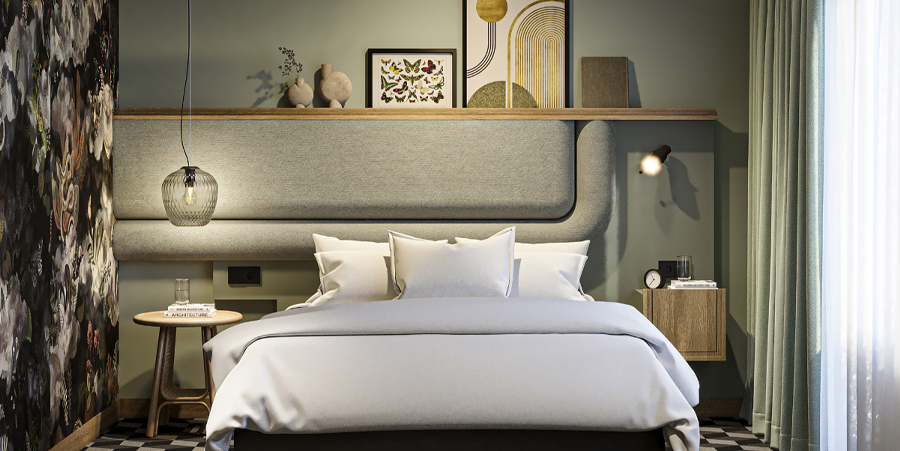Skift Take
Hotel executives admit they’re late to the party when it comes to adopting technology. Now, they’re trying to figure out the basics and adopt innovations all at the same time.
___ Justin Dawes
Hotel executives are the first to admit they’ve been behind the curve with new technology. The problem now is that travelers expect the tech in a hotel to be as good or better than what they have at home.
Catching up was the topic of a panel at HITEC in Toronto this week with executives from Mandarin Oriental Hotel Group, Accor, Fairmont, and more.
“I think we’re making progress, but we’re forced with our backs to the wall,” said Michael Levie, founding partner of Netherlands-based hotel chain CitizenM. “It’s a little bit embarrassing that we’re so late to the game, and there’s a lot of catching up to do.”
Many hotels still have cable television and telephones in their rooms, for example, but consumer needs have flown past that.
Tariq Valani, senior vice president of Global Support Services for Accor and global senior vice president of Technology for Fairmont Hotels & Resorts, believes that many hotel companies have lost touch with understanding what customers actually want.
“It’s a basic comparison to say that when you’re in a hotel, it’s the bed first and then it’s the shower and it’s the Wi-Fi — but maybe it’s the Wi-Fi first now,” Valani said. “When you don’t get that right, as a basic — that’s kind of like the core plumbing of what we’re doing. And so things like this are pain points that we actually need to resolve, get to the basics.”
A Complete Guest Profile
One of the key goals for hotel companies is to create a full profile of individual customers so they can provide personalized services. That means establishing a reliable system of customer data that’s accessible by every part of the business. Big hotel companies have been moving to modern cloud-based data systems in part to enable that transition.
The luxury brand Mandarin Oriental Hotel Group has been implementing technology to track activities of top guests – like when they check in or make a restaurant reservation – so hotel staff can then provide a higher level of service, according to Todd Wood, vice president of global applications and transformation for Mandarin.
“We’re implementing that so that we can then follow up and greet the guests and understand what the guests do and see if we might be able to help out,” Wood said.
The idea of this complete guest profile has been getting even more attention as it relates to hyper-personalization — being able to customize services based on specific customer interests — because of the latest advancements in artificial intelligence
“I think that really if you’re able to get your data clean and have a digital engagement with your guests, then generative AI has become fantastic because you can mass customize,” said Levie of CitizenM.
Sanovnik Destang, executive director of Bay Gardens Resorts in Saint Lucia, plans to be an early adopter of generative AI.
“I don’t think that the impact of AI is overblown. I think that we don’t know exactly how it’s going to impact us, but it is going to impact a lot of our tech providers. And we’re trying to get ahead of that as best as we can by staying on top of the latest trends and being at conferences like [HITEC].”
Destang said tech should cover everything down to enabling easy communication to guests even before they arrive.
“Generation Z is going to be our main source market in the next five, 10 years. And they think differently, they communicate differently,” Destang said. “If you don’t have some sort of messaging app already that allows guests to communicate with you that way, you need to get to that because that is how people are going to want to communicate.”
As a way to respond to guest demand for sustainable options, Valani said that Accor is implementing a “smart” thermostat.
“It’s better than what they had before, which was nothing, from a guest management perspective,” Valani said.
There’s a lot to consider, especially with more and more technology becoming available. As the industry continues to determine how to change, Wood of Mandarin suggested hoteliers keep one idea top-of-mind:
“What was the best experience you ever had from a travel standpoint? And how did that happen?” he said. “And how can we do that for our guests going forward so they can have that best experience every time — and it’s going to be different for different guests, and they’re going to want different things.”
___
This article first appeared in skift.com
Seeking to build and grow your brand using the force of consumer insight, strategic foresight, creative disruption and technology prowess? Talk to us at +971 50 6254340 or engage@groupisd.com or visit www.groupisd.com/story


